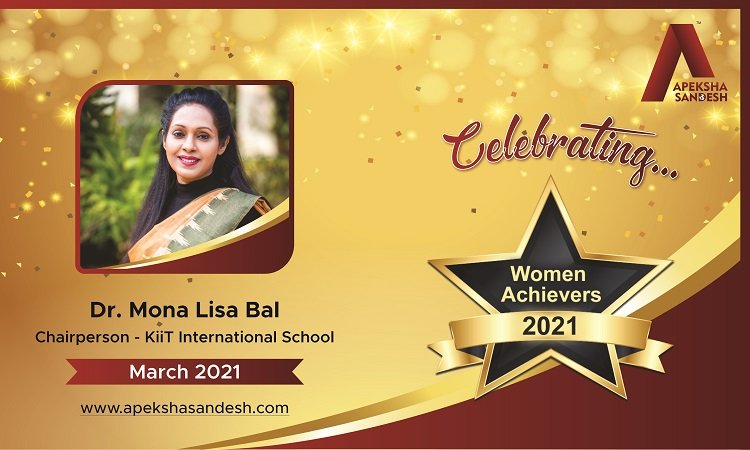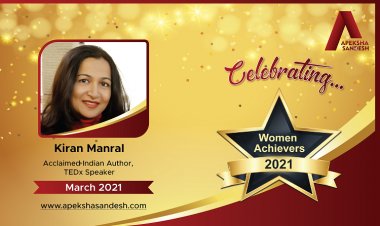If gender equality prevails in our homes, the next generation will grow up knowing this as normal: Dr. Mona Lisa Bal

Dr. Mona Lisa Bal is the Chairperson of KiiT International School. She is the guiding force behind the Vedic Memory Lab, a first-of-its-kind initiative in the country for empowering students to enhance learning with the best amalgam of traditional and modern pedagogical practices for holistic learning. Under her stewardship, the school has created a pool of trained teachers for special children, to give them the best opportunity to join mainstream learning with a meaningful, stress-free transition.
Besides, she is proactively engaged with KISS, a School for 25,000 tribal students and mentors selected tribal students for achieving the civil services. It is under her leadership that KiiT International School has achieved all-around excellence and is ranked among the top ten Schools of India. Several international awards and MOUs with organizations for academic excellence have been achieved under her tutelage.
Dr. Bal intends to take her passion in primary education forward by making an insightful foray into the Higher Education Sector where she has already contributed twenty-nine articles in internationally reputed educational journals like IOSR, IJARSE, British Journal of Education and World Journal of Educational Research. She is also pursuing her D.Litt. on ‘Social Inclusion and Educational Policy: A Study of KISS Odisha’ from Utkal University. A collection of her best research article has been recently published as a book titled ‘An Insight into India’s Education Policy’.
She was recently conferred with Mahatma Gandhi leadership award from the NRI welfare society in the House of Commons of Parliament in London. She also received the 'Emerging Leader’ award at Leadership Excellence Award 2019, Thailand, an initiative by Meccademia Education Group.
Apeksha Sandesh had a chance to interact with Dr. Mona Lisa Bal. Check out the excerpts!
Tell us something about your life before KiiT International school.
It has been a 15-year long journey with KiiTIS. Before joining KiiTIS, I was completing my Ph.D., studying joyful education keeping in mind, my aspirations of entering the field of education and helping children become distinguished individuals and accomplishing their dreams.
What exciting developments have you seen in the education sector since the time you started?
There have been quite a few developments and changes in the education system since I started. An integrated international approach has been adopted. However, I feel, the CCE (Continuous and Comprehensive Evaluation) pattern for secondary classes was quite beneficial and could have maintained the approach.
Tell us something about your initiative ‘Vedic Memory Lab’.
‘Vedic Memory Lab’ talks about the overall development of the children with the right integration of the right food, memory techniques, and Shree Vidya meditation. The lab aims the students in the art of Shree Vidya, Vedic memory, mind power, the art of visualization, the art of imagination, and many more so that students may recognize their hidden powers and potentials and bring back the glory of the country. This is the sole aim of the Vedic Lab. This will empower students of the 21st century. Students will be trained to enhance their memory and manage stress.
Education today is considered a business. What is your opinion on the same?
Education is the pillar of society. No society can progress without education. It helps the country grow and allows a human being to understand and live with challenges and produce good results. In order to survive and sustain in the ever-changing world, to keep abreast with the latest developments, innovations, and technologies, the financial aspect does come into play. However, it should never be considered a business. Like any other field, the education sector also needs financial backing to reap the benefits to the fullest.
In your opinion, what all can be done to create a joyful environment for children that can help attain effective learning?
First and foremost, we must focus on adopting innovative pedagogy. Rote learning can never be interesting for anyone and neither do they help children learning. Teaching must be activity-centric, through storytelling, gamification, and more. If anything intrigues children, they learn much faster and retain better as well. Teachers play a crucial role in the education system, and hence upskilling of teachers is also essential. They are the ones who mold a young mind. As the New Education Policy targets, schools must invest in upskilling their teachers. Other than studies, the focus must also be laid on destressing activities for the students and introducing happy quotients for them for holistic learning.
Though India has a lot of institutes and schools for special children, not many have been capable of helping them achieve by providing the kind of environment required. Being part of the mainstream infrastructure is always a struggle. What do you have to say about this?
There are more than 40 million children, countrywide, from age 4 to 16 years who have special educational needs, and this cohort needs to be integrated with the mainstream towards building a developed nation. Numerous researches have shown that children do better academically when in inclusive settings and inclusion provides opportunities to develop relationships. Personal private partnership as mentioned in article 12 C must be maintained. The private sector and the government should come together to focus on skills.
Do you have any suggestions for the government to enhance the overall infrastructure of education in India? What barriers have you faced as a woman in becoming successful in your field? How did you overcome them?
The pandemic has underscored the great digital divide that exists in our country, so addressing the digital gap between urban and rural areas should be our prime focus. Setting up the National Digital Educational Architecture (NDEAR) Development is a firm steppingstone towards a digital transformation but further stringent measures are needed. Upskilling of teachers and focus on holistic education, moving away from rote learning to strengthen analytical, conceptual skills of students will foster critical thinking among them, which will help in their overall development and learning.
As a woman, I definitely struggled at the beginning of my career, where my point of view was questioned a lot more. However, I must thank our revered Founder, Prof. Achyuta Samanta for his constant support who helped turn my challenges into a learning curve. Keeping myself updated on sectoral, national, and global developments, reasoning my arguments and holding my grounds, broadening my perspective, has helped me overcome these hurdles.
The movement for equality of women’s rights has been a long battle. Being treated the same as my male counterparts, not better, just the same. Equal opportunities and social rights for women… education, employment, etc. How far has this equality game reached or is successful? Can you suggest ways in which this can be achieved?
The struggle for equality and the fight for women’s rights have definitely come far but it has not reached its end. Slowly and steadily, we have been able to make changes and shatter the patriarchy that exists in society. Basic rights and opportunities do not have a gender demarcation. This learning should begin at home at the earliest age possible. If gender equality prevails in our homes, the next generation will grow up knowing this as normal. Schooling and education also play an important role in this and schools must enrich the young impressionable minds about equality. It should not be forced learning but something that should be naturally nurtured and inculcated as a way of living. Gender roles and gender biases need to make their way out of our society and a unified front is what is needed for this battle across all cross-sections of society.
What main change would you like to see for young girls in the next generation?
A future with equality and no restrictions would be an ideal one. I want to see a generation where women are not bounded by societal norms and prejudices, where women have equal pay in any chosen field of work, where they have equal opportunities and have the freedom to dream of achieving anything they want. Most importantly, a future where women get equal dignity and respect.
In your opinion, what is the significance of International Women’s Day?
According to me, every day should be a celebration of women. It should be a celebration of ordinary women doing extraordinary work, a celebration of equality in all aspects. Women have always been respected and treated as equals in ancient India and it is about time, we started practicing the same again. It is high time that women get their due for their contribution to society and be treated at par with men. There is a line in the dance drama, ‘Chitrangada’ by Rabindranath Tagore, where the Princess tells Arjuna that neither does she expect to be worshipped nor does she expect to be ignored but to be treated as his equal. This line resonates with the essence of how women want to be treated today, and we must act on it if we want to prosper as a society.
Apeksha Sandesh congratulates Dr. Mona Lisa Bal for her contribution and commitment towards the field of education with her works, and wishes her all the best for her future endeavours!















































